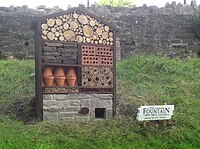
Photo from wikipedia
We review the evidence that learning affects fitness in non-social insects. Early accounts date back from the 1970s and were based on field-based observational and experimental work, yet exploration of… Click to show full abstract
We review the evidence that learning affects fitness in non-social insects. Early accounts date back from the 1970s and were based on field-based observational and experimental work, yet exploration of the ways in which various forms of learning increase fitness remains limited in non-social insects. We highlight the concerns that arise when artificial laboratory settings, which do not take the ecology of the species into account, are used to estimate fitness benefits of learning. We argue that ecologically-relevant experimental designs are most useful to provide fitness estimates of learning, that is, designs that include: firstly, offspring of wild-caught animals producing newly established stocks under relevant breeding conditions, combined with common-garden and reciprocal transplant experiments; secondly, the spatio-temporal dynamics of key ecological resources; and thirdly, the natural behaviours of the animals while searching for, and probing, resources. Finally, we provide guidelines for the study of fitness-learning relationships in an eco-evolutionary framework.
Journal Title: Current opinion in insect science
Year Published: 2018
Link to full text (if available)
Share on Social Media: Sign Up to like & get
recommendations!